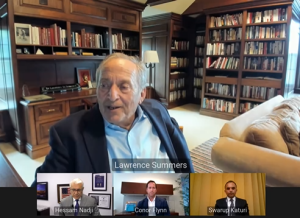Former US Treasury Secretary: CRE Could Face ‘Recession of Choice’
Lawrence Summers and other industry leaders discussed market resilience in a video call hosted by Marcus & Millichap.
A video conversation hosted by Marcus & Millichap CEO Hessam Nadji with former U.S. Treasury Secretary Lawrence Summers, Brookfield Asset Management Partner Swarup Katuri and Kimco Realty Corp. CEO Conor Flynn revealed many insights regarding commercial real estate and the current economic horizon.
Hosted within hours of an August inflation report that showed a higher rate that dimmed some predictions of economic resilience, on top of a plummeting Dow Jones average, the participants offered cautiously optimistic, yet sobering takes on the current economic outlook, especially as it relates to commercial real estate.
Differing predictions
Summers saw it as “unlikely” that the economy would spontaneously trip into recession, especially over the course of the next two years. At the same time, Summers saw Federal Reserve’s mission to contain inflation at any cost by restricting demand and increasing interest rates as something that could potentially expedite one, describing it as, ultimately, a “recession of choice.” The former head of the U.S. Treasury pointed to substantial job growth, as well as demand-exceeding supply across all facets of the economy as indicators of a sort of foundational strength. Still, Summers saw this growth as eventually having to experience a slowdown, with commercial real estate investment and demand possibly suffering in the process.
Summers perceived strong indicators for commercial real estate, seeing substantial opportunity for growth in the retail market. This is in no small part due to the rise of e-commerce, a return to in-person shopping and quick revisions of uses for spaces intended for sales but repurposed for shipping and fulfillment, and vice-versa. he added.
READ ALSO: How Inflation Affects Corporate Real Estate Decisions
Flynn expressed a similar sentiment, citing a strong retail job market, with Kimco adding $44 million to its net operating income before the end of the year, and a pipeline of retailers leasing space set to open that have taken up all existing supply. Flynn spoke about how more socially-oriented patronage at restaurants and bars has considerably exceeded those of other retail types, with fitness and entertainment-related demand also seeing major increases. Kimco’s CEO attributed this, in part, to a desire among the public to reclaim “something taken away from us,” seeing reopening and a shaking-off of pandemic-related isolation, economic stimulus and a slow end to the “suburbanization trend” that the nation had been experiencing for the past two years. Furthermore, Flynn spoke about the value many are getting out of shopping in person, even in more trivial tasks such as grocery shopping.
The office remains opaque
All participants were quick to acknowledge the harm office real estate has suffered, offering differing insights for its future. Regarding the question of whether to return, and, if so, how frequently, Katuri saw the office environment as creating a degree of collaboration that cannot be found in the work-from-home scenario, underlining that this idea is fundamental to consider. Flynn agreed, mentioning Kimco’s embrace of a hybrid model, wherein many of the firm’s offices were based in the retail locations themselves, achieving a more “boots-on-the-ground” approach. Yet, at the same time, he spoke about the convenience and practicality of conducting some aspects of the business remotely. Flynn talked about the difficulty Kimco was experiencing with respect to transferring the company’s culture to new employees and others less acclimated to the office environment.
Summers similarly endorsed a middle-ground approach, highlighting the benefits of a model that sees employees in the office three days a week. The former U.S. Treasury secretary perceived this model as making employees more comfortable with living further away from the office, yet still willing to commute to it, which would likely be more cost-effective for them in the long-term. At the same time, this makes a full-time return to the office more difficult.
The investment snapshot
All the participants were in agreement over commercial real estate’s existence as a lucrative investment opportunity, seeing it as a strong, resilient asset due to its more levered existence, relative resistance to inflation and not being 100 percent equity financed. In the future, the participants see the role of commercial real estate investment portfolios as likely to be far greater.








You must be logged in to post a comment.